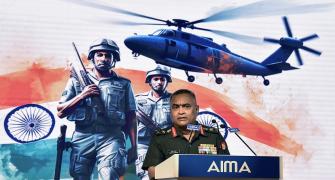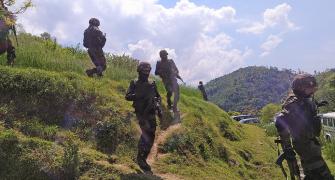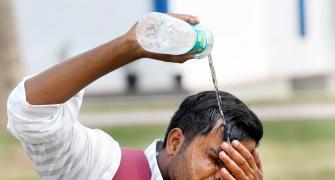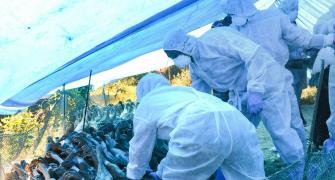He is associated with the South Asia Analysis Group and the Chennai Centre for China Studies.
Colonel Hariharan spoke to rediff.com's Shobha Warrier about what needs to be done to avoid terror attacks like the one in Mumbai terror attacks.
Media reports say that the Indian intelligence agencies had prior information about the Mumbai terror attacks. After every terror attack, we hear reports that intelligence agencies had prior information about it. Where is it going wrong then? Do you call this an intelligence failure?
I have no hesitation in saying that it was intelligence failure that led to the attacks. Today's terrorists are more tech savvy than the establishment.
Intelligence failure is not only the failure of intelligence agencies. They have to process the information and make an assessment.
There are more than 12 agencies like the Customs, the Enforcement Directorate etc which collect intelligence information, and this excludes the state police.
Firstly, the quality of intelligence collected has to be validated. No agency shares the information with everybody because they want to score brownie points.
What we need is a central control room where intelligence information is shared and immediate action is taken. We don't have a culture of centralised control rooms. I know the Intelligence Bureau has enough intelligent officers, but they don't process intelligence information properly because they are in a hurry to push it so that the responsibility does not fall on them.
How important is processing the information?
It is the most important part of intelligence gathering. You may say, a terror strike is coming from the coast. But from where? Which coast? From whom? When? These questions are never answered. In military intelligence, we don't accept this kind of nonsense.
The Americans failed in processing the information before the 9/11 attacks. We told them a year earlier that Islamic militant guys are being trained in flying. We had told Australia that they are being trained in Australian flying schools. They passed it on to the Americans but nobody took action because they had too much information.
We have to have management in our information systems. Technology is rudimentary in India. We are a lazy nation as far as the governing system is concerned. So, why blame the intelligence agencies alone? You should blame the government, the various departments and ourselves.
Do you think the current attacks will ring alarm bells and something concrete will happen?
I am not an optimist. I expect some more strikes to come. Will just changing the Union home minister solve the problem?
I am not seeing any action now. There will be more strikes. Something like what is happening in Bangkok has to happen in India too. Everything has to be stopped to make the government act. People have to take to the streets. Only that works.
The ordinary people of India feel that after the 9/11 attacks, the US could stop any further attack while in India, every month, there is a terror strike...
Are we prepared to sacrifice some of our fundamental rights? That is the bottom line. The US has sacrificed part of their fundamental rights. US laws are very stringent. We didn't want POTA which guarantees witness protection.
Where should the overhaul start?
It has to be there everywhere; from the grass-roots to the middle level to the structural level.
Three things are important. At the state level, they must read and process the information themselves. The central agencies and state agencies should share information all the time. Today, they don't do that. The culture of sharing of information should come. In Assam, I have seen only army guys in the meetings; the state guys won't even turn up. Some sort of commitment has to come within the states.
Two, the country must learn to sacrifice some rights to fight terror. While fighting terror, you cannot have the same freedom. Unless you sacrifice, you can't fight terror.
Three, our laws will not hold today's times. You catch two out of 15 terrorists, but you cannot prosecute them. Human rights fellows will make a noise; courts will give them bail even if they are murderers. That is why so many Maoists are not being prosecuted. So, you require a special law.
The coast of India is controlled by many departments, and do you feel it is high time the coast comes under one agency, say the Coast Guard?
There are 12 agencies involved in the coastal security of India. In this country, nobody will give up power. Port security is under the ministry of shipping! What does it know of security?
In the US, when a ship comes to the sea, it comes under the Coast Guard. It is responsible for the coast. Here, it is not. The land is under police, the coastal police have become a big joke. The policemen do not know how to swim. They don't have a sea orientation. Why should you have the same policemen doing the coastal job? You require marine police who should look after coastal and port security.
The Coast Guard has got huge deficiencies like the armed forces. They must make up the deficiency right now. Marine security must come under central authority and the Coast Guard is the best arm. It comes under the navy both in the US and here.
Create internal security separately as a ministry. The time has come.
There is a kind of fear and insecurity in the mind of the people of India.
It can happen in Chennai too. Are you sure it will not happen in the other coasts? In Maharashtra, it will change now just like it changed in Gujarat. Gujarat has a dynamic chief minister and he knows his job. He wanted a law which is similar to what Mumbai is having, but he is not being allowed based on party politics. The Centre also won't bring the law and he also won't be allowed to have a law, and he is asked to control terrorism. What are we afraid of?
When you were gathering intelligence as a military intelligence officer, what were the difficulties you faced?
The major problem is of access to other intelligence agencies. There is no sharing of information. That is the biggest hurdle.
In Sri Lanka, that was what happened. The Research and Analysis Wing was involved in training the LTTE (Liberation Tigers of Tamil Eelam) but it is so compartmentalised that when we went in, the guy from R&AW who was helping us did not have the figures because it was under some other department. So, we must take some hard decisions on sharing information.
Every month there is a terror strike. Will Indians have to learn to live with terror attacks?
Do you know such attacks are happening regularly in the north-east? This is the 8th terror attack this year. I am sure it will continue.
- Unless we must have a transparent policy that will guide the structural framework.
- Unless the media acts conscientiously. You give more prominence to Arundhati Roy for defending a guy who attacked our Parliament.
- Unless the structural mechanism involves states and becomes federal in character.
- Unless decision making is done by experts and not politicians.
- Unless you make up the deficiencies of all the counter-terror mechanisms with modern technology.
- Unless policy making, intelligence and execution work in tandem.
There are politicians in the US and the UK too, but they could manage to stop terror attacks.
Because they are Americans, and we are Indians, I am sorry to say. We have no commitment. Did people react the same way when the Mumbai local trains were attacked? They did not because the rich and VIPs were not involved. Because five star hotels were not involved. Only poor guys, who travelled by train suffered. Did you see the same candles then?
Photograph: Sreeram Selvaraj
Also Read:







